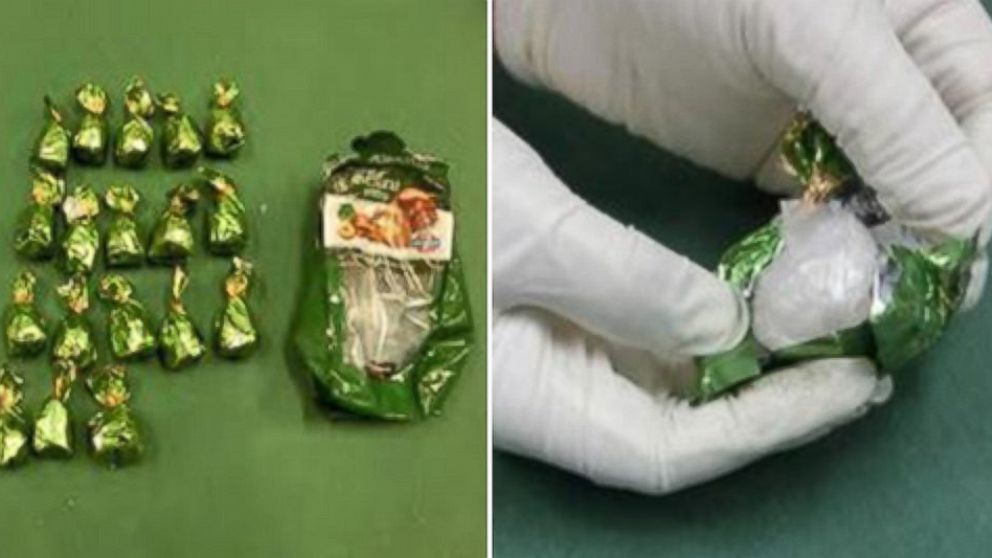The Elderly Being Conned Into Trafficking Drugs
"I lost basically two years of my life," Florida man, 74, says of meth arrest.

— -- Floridian Ralph Soles, 74, said he was caught transporting methamphetamine into New Zealand two years ago. He was arrested and spent the next 18 months in custody, he said, eventually gaining his release on appeal.
“I lost a lot,” Soles said. “When I came home, I didn’t have a home. I didn’t have a home to go home to.”
The Lakeland, Florida, resident is one of dozens of elderly U.S. citizens who’ve been unwittingly conned into becoming drug mules, officials say.
U.S. Immigration and Customs Enforcement (ICE) and U.S. Customs and Border Protection (CPB) announced today an investigation into the scam for the first time and issued a warning at a Senate hearing convened by the Special Committee on Aging.
“Those who target vulnerable populations, to include our elderly, are among the worst kinds of criminals,” ICE Director Sarah R. Saldaña said.
ICE Homeland Security Investigations (HSI) and CBP, along with foreign counterparts as a part of "Operation Cocoon," have intercepted 144 people who were allegedly transporting drugs, which included methamphetamine, cocaine, ecstasy and heroin, according to ICE.
Fifteen people affiliated with a transnational criminal organization were also arrested in connection to these alleged crimes, ICE said.
More than 30 elderly U.S. citizens are still incarcerated overseas in connection with the drug scam, according to investigators.
The average age of the conned narcotics couriers was 59, ICE says. The oldest individual involved in the scheme was 97, but he was stopped by HSI agents before leaving the United States, according to ICE.
Before Soles traveled overseas, he said he was emailed repeatedly by a man who said he wanted to invest in Soles’ company.
Soles, who at the time managed investments in commercial businesses and properties, said he eventually responded to the man, who called himself “Lawrence Green.”
The so-called Green and Soles began talking on the phone and became friends, he said.
In 2013, he got on a plane for Johannesburg, South Africa, to meet with Green to “set-up a bank account,” Soles said. But when he arrived, he added, Green informed him that he had gone on vacation to Fiji and asked Soles to meet him there.
So Soles said he agreed to make what he thought was a business trip.
Before taking off, Soles was asked to bring a suitcase with him, he said, adding that a man brought the suitcase to Soles’ hotel, where he said he looked inside and saw nothing but clothes.
The first leg of his flight took him through Bangkok, Thailand, where he said he went in and out of the airport during his layover, he said. He then flew for the second leg to New Zealand, where he was stopped by authorities, Soles said.
“They knew what they were looking for, because there was something in that suitcase,” he said.
He was arrested, convicted and spent a total of 13 months behind bars, he said, eventually gaining his release after being acquitted at a second trial.
The scammers entice their victims, like Soles, with the promise of an inheritance or business opportunity and then a request that they fly to various countries to meet with “attorneys” or “business partners,” ICE officials said.
Sen. Susan Collins, R-Maine, chairwoman of the Special Committee on Aging, said in her opening statement today, “Once the seniors are ensnared, the criminals then deceive them into smuggling drugs by asking them to travel overseas, where they are given packages with unknown contents to carry across international borders.”
The seemingly harmless items have included chocolates, picture frames, tea, markers, canned goods, shampoo bottles, soap and wooden hangers that actually conceal drugs, which can result in arrest and detention by authorities.
Soles said he later found out that drugs had been sewn into the lining of the suitcase he was asked to take.
He said he wants the U.S. government to get more involved in helping the elderly in similar situations abroad and is speaking out so others who are still in jail overseas don’t feel as alone.
“I’m 74 years old,” he said. “I lost basically two years of my life. I got a heck of an education.”




